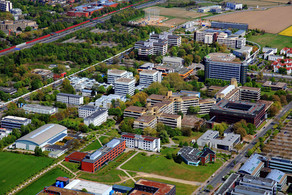Research Applications
Compensation for business trips when applying for funding
There is no general answer as to whether compensation costs for CO2 emissions from business trips can be taken into account in a funding application. This depends on the respective funding guideline. However, sustainability is now increasingly coming into focus in various application lines, so it may be worth taking a closer look.
Order of magnitude of the compensation costs
For example, according to the UBA calculator, a flight from Düsseldorf to New York emits approx. 1.3 tons of CO2. The current CO2 price (as of February 2, 2024) is €57.27 ($62.30) per ton of CO2. This results in a theoretical compensation payment of €74.45 for the flight in question. Applying the UBA's recommendations for quantifying the climate costs per tonne of CO2 (in German) results in a cost rate of €237 per tonne of CO2 with a time preference rate of 1% (higher weighting of today's generation compared to future generations) or €809 per tonne of CO2 with a time preference rate of 0% (equal weighting of generations). This would result in a compensation payment of € 308 or € 1052 for the aforementioned flight.
Example based on a funding guideline
In the BMBF's announcement of September 11, 2023 of the guideline for funding projects on the topic of "Dealing with diversity - making teaching diversity-sensitive and effective for learning" ("Richtlinie zur Förderung von Projekten zum Thema „Umgang mit Vielfalt − Unterricht diversitätssensibel und lernwirksam gestalten", in German), the following statement can be found under the item "Type, scope and amount of grants" on the subject of CO2 compensation for business trips:
"CO2 compensation payments or business trips can be recognized as eligible expenses or costs in accordance with the 'Guidelines for grant applications on an expenditure basis (AZA/AZAP/AZAV)' or the 'Guidelines for grant applications on a cost basis from commercial enterprises (AZK)'." [Quoted from the German directive. The texts only exists in German.]
If you look in the relevant guidelines, there is nothing in the AZK guideline (in German) on business trips or their compensation. The AZA/AZAP/AZAV guidelines (in German) contain the following information:
"Insofar as this is provided for in the funding guideline, anticipated expenses for intended CO2 offsetting can also be specified. It is possible to estimate expenses for one-day business trips at a flat rate of €230. This includes travel costs for the outward and return journey, including any CO2 offsetting, daily allowances and any conference and congress fees. For business trips lasting several days, an additional amount of €100 per necessary overnight stay can be estimated, which includes accommodation costs and daily allowances. The above amounts are to be understood as guidelines. Deviating figures are possible. Expected expenses in excess of this must be explained." It is further explained: "Recognition of CO2 offsetting as eligible expenditure requires that the emissions generated by air travel and car journeys are reliably calculated using the Federal Environment Agency's CO2 calculator or a comparable tool. The calculation must be available. With regard to quality assurance, the certificates should originate from projects that are certified according to CDM (Clean Development Mechanism) or equivalent standards. One CO2 certificate can be purchased per ton of carbon dioxide equivalent emitted. There must be no double funding from the state, in particular the CO2 compensation payment must not be tax-deductible as a donation." [Quoted from the German directive. The text only exists in German.]
The emissions could therefore be calculated and offset on the basis of the UBA calculator or directly with CDM-certified offset providers. However, CDM certification of the provider is mandatory here.




